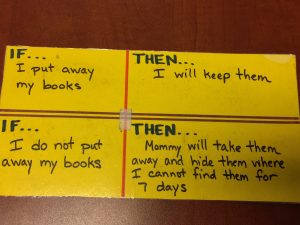Meaningfully participating in community outings is one of the most important areas that we can address, for any individual with or without autism. Community-based experiences provide opportunities to work on social skills, following instructions, transitioning appropriately, and otherwise learning how to just be around other people. But being in the community can be very stressful for some parents and caregivers, and this may understandably cause some to avoid the community. Here are five proactive ways to make community outings a success for you and your family:
Use visual supports
 Let the child know what is to be expected in the community. If you are taking him to the grocery store, provide a “First, Next, and Finally” board with the written or picture-based list of activities involved in going to the grocery store. For example, the sequence might depict the following events: “First, we ride in the car to the grocery store. Next, we will get our food and pay for them at the cashier. Finally, we will get back in the car and head home.” It is important to note that each individual will require different types and levels of complexity to their visual supports. Some will follow a written list, others may need pictures, and others may do well following a timer. There are a variety of phone apps that support schedules and shopping as well. Such visual supports help individuals with autism (and anyone!) to understand what will happen, in what order, and when the outing will be finished.
Let the child know what is to be expected in the community. If you are taking him to the grocery store, provide a “First, Next, and Finally” board with the written or picture-based list of activities involved in going to the grocery store. For example, the sequence might depict the following events: “First, we ride in the car to the grocery store. Next, we will get our food and pay for them at the cashier. Finally, we will get back in the car and head home.” It is important to note that each individual will require different types and levels of complexity to their visual supports. Some will follow a written list, others may need pictures, and others may do well following a timer. There are a variety of phone apps that support schedules and shopping as well. Such visual supports help individuals with autism (and anyone!) to understand what will happen, in what order, and when the outing will be finished.
Provide choices
When feasible, provide opportunities for the child to pick the outing location and activities. Everyone needs choices, and this can give the individual a greater sense of power and control over the situation. For some, it may be appropriate to offer these choices in the morning to set the goal and expectation for the day so you can begin planning early. If there is a required outing or errand, such as grocery shopping, try to follow that required activity with a preferred or chosen activity. During the required outing, allow your child choices within the routine as well, such as helping to push the grocery cart, deciding which way to go first in the store, helping to load the items onto the conveyor belt, etc. While this is still your required outing, this may allow the child to gain a sense of control throughout the presumably less preferred activity.
Catch them being good
Offer lots of reinforcement, including breaks if needed, throughout the community outing. If the child is walking with you throughout the grocery store or calmly transitioning from the park back to the car, let them know you recognize their behavior. Provide them with positive feedback and other preferred items or activities, such as access to electronics, a toy, or a piece of candy. Some will need this multiple times across the activity rather than just at the end of the activity.

Structure outing length
If you know that going to see a movie or walking around the mall might take more than 30 minutes, set that expectation with the child ahead of time. In some cases, it will be helpful to provide them with a set time of how long you will be gone. For example, if you are going to the mall, convey the expectation that you will be at the mall from 10:30 a.m.-11:45 a.m. For younger learners or individuals who might not understand those concepts, providing a concrete visual schedule of events or timers can be more meaningful. This will establish a sense of control for the child and a heads-up on when the outing is complete. It is important to note that some children will require very short trips (for example, starting with up to 5 minutes or purchasing one item in a store) and systematically increasing in time as the child is able to show success in the community.
Fit the outings to your family
While committing to going out into the community two or even three times each week can be a struggle for some families, there is no set number of times that is considered a “trophy” for success for each family. In other words, just exposing your child to different areas of the community, such as the library, is important for each child to learn and be familiar with the expectations for their surrounding environments. It is also important to try to include “must-do” activities, such as grocery shopping, getting gas, returning items at a store, or mailing packages, into your child’s community outings to further work on expectations.
While these strategies can help to establish a set of boundaries and expectations for the child, they do not eliminate problem behavior altogether. We acknowledge that community outings can be hard for some families and at the Autism Society of North Carolina, we can provide help through additional resources and support. And above all, have fun with your family out in the community!
Tara Hrabosky, MEd, Registered Behavior Technician (RBT) and BCBA student with ASNC, can be reached at thrabosky@autismsociety-nc.org.
ASNC’s Clinical Department staff is composed of PhD and master’s-level licensed psychologists, Board Certified Behavior Analysts, and former special education teachers. We provide individualized intensive consultation using evidence-based practices to support children and adults across the spectrum in home, school, employment, residential and other community-based contexts. We also deliver workshops to professionals on a wide range of topics including but not limited to, strategies to prevent and respond to challenging behaviors, best practices in early intervention, functional communication training, and evidence-based practices in instruction for K-12 students with autism.
To find out more, contact us at 919-390-7242 or clinical@autismsociety-nc.org.
Tags: ASNC, Asperger Syndrome, Asperger's Syndrome, autism, autism anxiety, autism asperger parenting tips, autism behavior, autism nc, autism north carolina, autism society north carolina, autism society of NC, Autism Society of North Carolina, Autism spectrum, Autism Spectrum Disorder, Autism Spectrum Disorders, autism support, Developmental disability Go back

